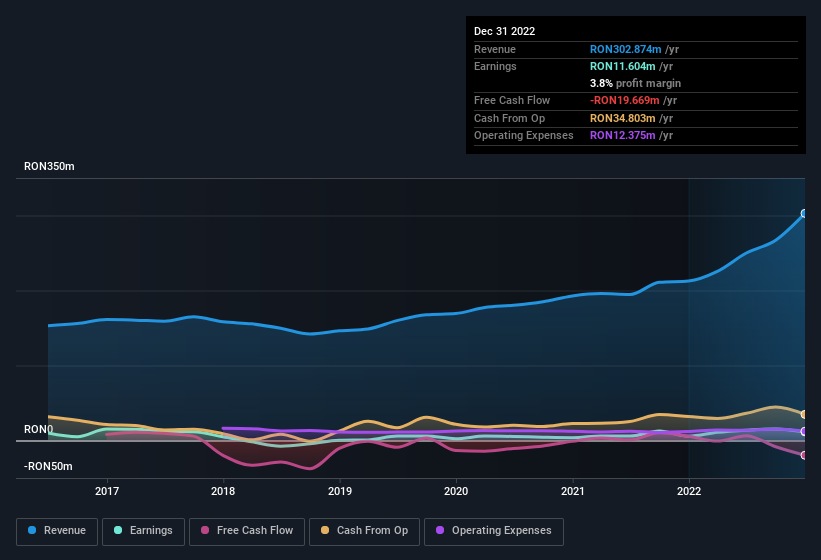
Oil Terminal S.A. (BVB:OIL) announced strong profits, but the stock was stagnant. Our analysis suggests that this might be because shareholders have noticed some concerning underlying factors.
See our latest analysis for Oil Terminal

To understand the value of a company's earnings growth, it is imperative to consider any dilution of shareholders' interests. As it happens, Oil Terminal issued 415% more new shares over the last year. That means its earnings are split among a greater number of shares. To celebrate net income while ignoring dilution is like rejoicing because you have a single slice of a larger pizza, but ignoring the fact that the pizza is now cut into many more slices. You can see a chart of Oil Terminal's EPS by clicking here.
How Is Dilution Impacting Oil Terminal's Earnings Per Share (EPS)?
Oil Terminal has improved its profit over the last three years, with an annualized gain of 384% in that time. And at a glance the 102% gain in profit over the last year impresses. On the other hand, earnings per share are only up 102% in that time. And so, you can see quite clearly that dilution is having a rather significant impact on shareholders.
Changes in the share price do tend to reflect changes in earnings per share, in the long run. So it will certainly be a positive for shareholders if Oil Terminal can grow EPS persistently. But on the other hand, we'd be far less excited to learn profit (but not EPS) was improving. For that reason, you could say that EPS is more important that net income in the long run, assuming the goal is to assess whether a company's share price might grow.
Note: we always recommend investors check balance sheet strength. Click here to be taken to our balance sheet analysis of Oil Terminal.
Our Take On Oil Terminal's Profit Performance
As we discussed above, Oil Terminal's dilution over the last year has a major impact on its per-share earnings. For this reason, we think that Oil Terminal's statutory profits may be a bad guide to its underlying earnings power, and might give investors an overly positive impression of the company. But on the bright side, its earnings per share have grown at an extremely impressive rate over the last three years. At the end of the day, it's essential to consider more than just the factors above, if you want to understand the company properly. So while earnings quality is important, it's equally important to consider the risks facing Oil Terminal at this point in time. To help with this, we've discovered 2 warning signs (1 is a bit unpleasant!) that you ought to be aware of before buying any shares in Oil Terminal.
This note has only looked at a single factor that sheds light on the nature of Oil Terminal's profit. But there are plenty of other ways to inform your opinion of a company. Some people consider a high return on equity to be a good sign of a quality business. So you may wish to see this free collection of companies boasting high return on equity, or this list of stocks that insiders are buying.
New: AI Stock Screener & Alerts
Our new AI Stock Screener scans the market every day to uncover opportunities.
• Dividend Powerhouses (3%+ Yield)
• Undervalued Small Caps with Insider Buying
• High growth Tech and AI Companies
Or build your own from over 50 metrics.
Have feedback on this article? Concerned about the content? Get in touch with us directly. Alternatively, email editorial-team (at) simplywallst.com.
This article by Simply Wall St is general in nature. We provide commentary based on historical data and analyst forecasts only using an unbiased methodology and our articles are not intended to be financial advice. It does not constitute a recommendation to buy or sell any stock, and does not take account of your objectives, or your financial situation. We aim to bring you long-term focused analysis driven by fundamental data. Note that our analysis may not factor in the latest price-sensitive company announcements or qualitative material. Simply Wall St has no position in any stocks mentioned.
About BVB:OIL
Oil Terminal
Operates a terminal for import, export, and transit of crude oil, petroleum, petrochemical, liquid chemical products, and other services in south-eastern Europe.
Adequate balance sheet with questionable track record.
Similar Companies
Market Insights
Community Narratives



